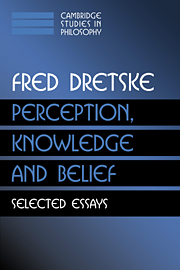6 - Simple Seeing
Published online by Cambridge University Press: 19 December 2009
Summary
I met Virgil Aldrich for the first time in the fall of 1969 when I arrived in Chapel Hill to attend a philosophy conference. My book, Seeing and Knowing, had just appeared a few months earlier. Virgil greeted me with a copy of it under his arm, whisked me off to a quiet corner in a local coffee shop, and proceeded to cross-examine me on its contents.
I confess to remembering very little about this conversation. I was, of course, flattered by the attention, and delighted to see his copy of the book full of underlining and marginalia. He had obviously been studying it. This fact so overwhelmed me that I found it difficult to keep my mind on the conversation. What could I have written that he found so absorbing? Did he like it? Did he agree with me? It was hard to tell.
Since then I have discovered what provoked Virgil's interest. It seems we disagree about what seeing amounts to – what it means, or what is essential to, our seeing things. This, by itself, is not particularly noteworthy since (as I have also discovered) many, and sometimes it seems most, philosophers disagree with me on this topic. The significance of Virgil's and my disagreement about visual perception lies not in the fact that we disagree, but in how we disagree. For it turns out that we are more or less natural allies in this area.
- Type
- Chapter
- Information
- Perception, Knowledge and BeliefSelected Essays, pp. 97 - 112Publisher: Cambridge University PressPrint publication year: 2000
- 7
- Cited by



